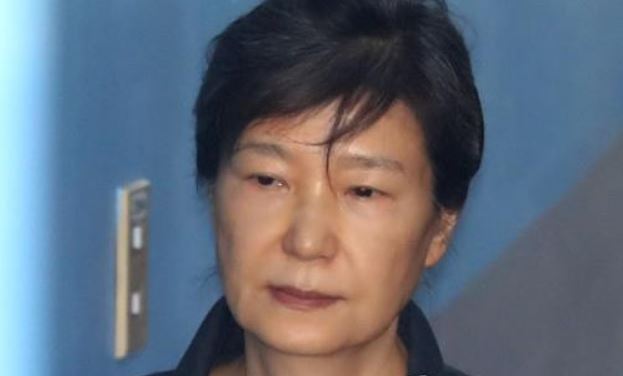Morality and honesty were what former President Park Geun-hye had touted as her biggest strengths, qualities that never needed to be called into doubt.
"I have no family to look after, or children to leave my property to." She uttered her famous line in her last stump speech on Dec. 18, 2012, a day before she won the election. "The people of this country are the only family I have, and whose happiness is the sole reason I do politics for."
Five years later, she is now in jail on bribery, abuse of power, and other charges that led to her ousting last year. She is expected to receive heavy punishment in a sentencing trial on Friday, as judges have found her accomplices guilty on 15 of the 18 criminal charges she faces.

Former President Park Geun-hye (Yonhap)
This month, South Koreans witnessed yet another fall from grace of a former leader. Lee Myung-bak, Park's predecessor, was arrested over a string of corruption charges that center on his suspected ownership of a lucrative auto parts company currently run by his brother.
"It didn't seem real seeing two (former) presidents put behind bars," said Kim Jeong-hee, a 71-year-old from Wangsimni in eastern Seoul. "My husband and I felt almost betrayed because we voted for them. But if they did anything wrong, they deserve to be held accountable like any one of us."
Park and Lee are only the latest in the list of South Korea's former heads of state facing criminal investigation post-tenure.
Late former President Roh Moo-hyun was grilled in 2009 over a corruption scandal involving his family. The probe was closed after he committed suicide in May that year.
Ex-Presidents Chun Doo-hwan and Roh Tae-woo, who seized power in a 1979 coup and ruled the country from the 1980s to the early 1990s, were convicted of corruption and mutiny before they were pardoned in 1997 by then-President Kim Young-sam. Kim and his successor Kim Dae-jung also saw their sons charged with bribery.
The political scandals involving Park and Lee have amplified calls to overhaul the Constitution and the presidential system.
A majority of Koreans agree on the need to rewrite the charter in a way that will curtail the over-concentration of presidential power, which in a nutshell, is designed to give the head of state influence in almost all senior government appointments and policy decisions.
"A president is known to name up to 7,000 people to various posts during a five-year term," said Yoo Yong-wha, a political analyst and visiting professor at the Hankuk University of Foreign Studies. "No one could hardly even remember 7,000 people, let alone give each of them a job. That, itself, is a slice of what we refer to as, to use the technical term, the 'unbelievable overpower' of the president."
The Constitution was last revised in 1987 to restore a direct presidential election. It was the first democratic revision to South Korea's constitution after the basic law was arbitrarily tweaked by authoritarian rulers to lengthen the terms of their presidency and tighten their grip on power.
"We never had a chance to question and ponder over our presidential system," Yu Chang-seon, a political commentator, said.
"We lived under the harsh rules of authoritarian governments, and we were in a hurry to industrialize and live better. To some extent, we preferred a leader making decisions for us."
A lack of effective checks and balances has left much room for the president and aides to take advantage of their power, Yu noted.
"If it was not the president, there were always family members, aides and others close to the president indulging in power for their own good," he said.
The liberal Moon Jae-in government and the National Assembly are currently wrangling over the long overdue constitutional reform.
A recent survey by Gallup Korea in January showed 55 percent of respondents said the constitutional revision is "necessary," while 32 percent were opposed to it.
Forty-six percent agreed with having two four-year presidential terms, and 65 percent said the country should hold a referendum in tandem with the June local elections.
The Moon government wants the vote to be carried out during the upcoming mayoral and gubernatorial elections, but opposition parties want the referendum to be held later in the year.
The government-proposed revision calls for a change in the presidential tenure from the current single five-year term to a maximum of two consecutive four-year terms.
The main opposition Liberty Korea Party is pushing for a power-sharing model in which the president would mainly take charge of external affairs, such as diplomacy and security, while the prime minister, picked by the parliament, would deal with domestic affairs.
"Giving the parliament power to nominate the prime minister and letting the president keep his veto right could be a solution," Yu said. "(The government and parliament) need to meet halfway in terms of what to give and what to take, because the opportunity may not always be there." (Yonhap)





![[From the Scene] Monks, Buddhists hail return of remains of Buddhas](http://res.heraldm.com/phpwas/restmb_idxmake.php?idx=645&simg=/content/image/2024/04/19/20240419050617_0.jpg&u=20240419175937)
